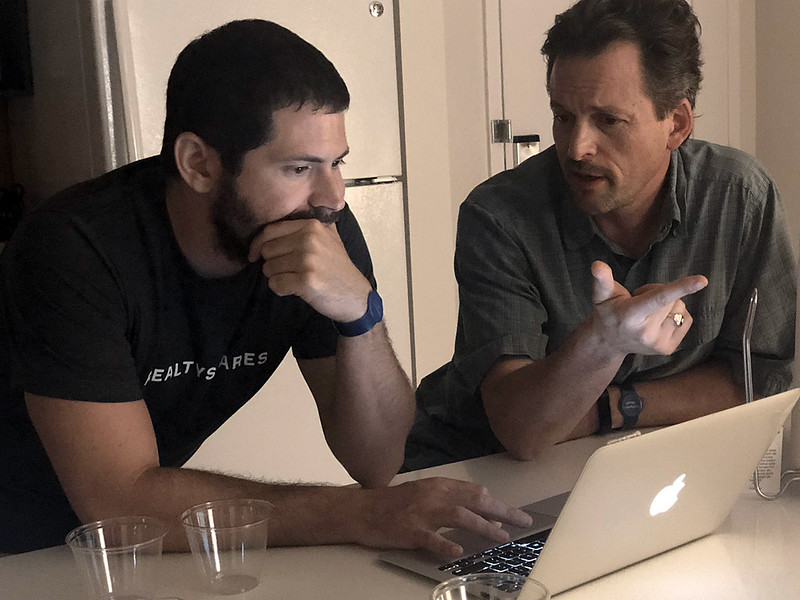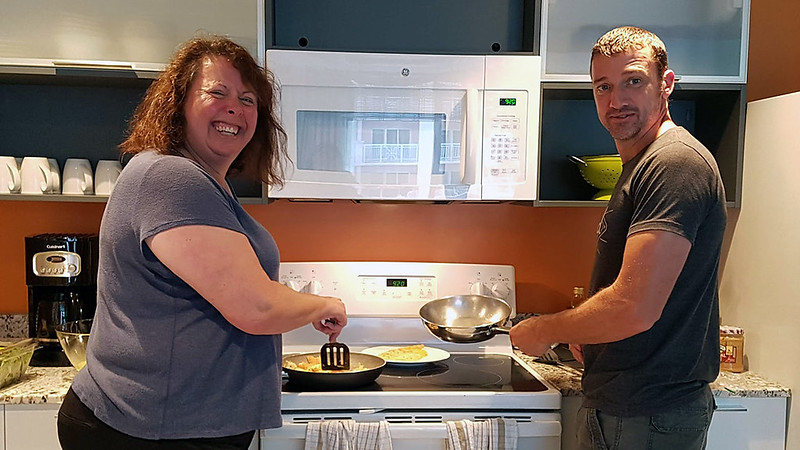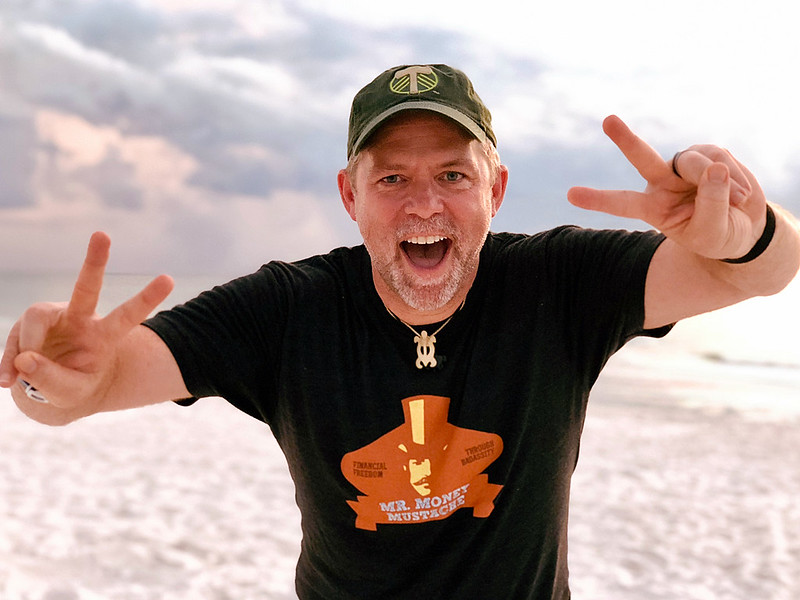What happens when a half dozen money nerds spend 48 hours together in Clearwater, Florida? Do they romp on the beach? Swim in the ocean? Cook dinner together? Drink copious quantities of alcohol? Stay up until three in the morning, laughing and telling stories? Yes. Yes, they do all of these things.
But they also spend a lot of time talking about money. A lot of time talking about money. (That’s what makes them money nerds!)
For the past few days, I’ve been hanging out with some of my favorite fellow money nerds, including Mr. Money Mustache, Paula Pant (from Afford Anything), Joel (from FI 180), Marla (featured on this Mad Fientist podcast), Ben (who wrote this MMM article about how he gets his cars for free), and the effervescent Heather, who has no blog connections at all — but might someday.
Our little group has discussed many financial-related matters this week, some serious and some silly. One particular topic has occupied a great deal of our mindspace.

Four Questions About Money
I’m not sure how it came up, but during a conversation between Ben and Paula, he asked what she’d do if she were given $100,000 with no strings attached. She said that she’d buy another rental property. (Paula is building a burgeoning real-estate empire.) Paula asked Ben how he would spend a $100,000 windfall. He didn’t know.
Paula and Ben then dove deeper. They tried to attach conditions to this theoretical $100,000 to see how that altered their answers.
Ben liked this conversation so much that he decided to grill everybody else. He quizzed us one at a time so that we couldn’t hear what others had said unless we’d already been subjected to questioning. (This was an attempt to prevent our responses from being influenced by anybody else. Ben wanted gut reactions.)
Here are the four questions we’ve been exploring:
- Imagine you’re given $100,000 cash with no strings attached. Maybe you win the lottery or you find a pile of money in a barn. It’s a $100,000 windfall. How do you spend it?
- Now imagine you’re given $100,000 cash but with one condition. You must use the money to do something constructive that won’t produce a profit or financial return for at least one year. What do you do with it?
- Next, imagine you’re given $100,000 with a different catch. You have to spend it on something completely frivolous. You have to spend it on something fun. It has to be a splurge. What is that splurge?
- Finally, imagine you have $100,000 that must be used for philanthropic purposes. You have to use it to improve the lives of others. How do you do that?
The different answers to these questions are fascinating. (To us, anyhow.) There’s some overlap to our answers, but there are also plenty of differences, especially with regards to frivolous spending and charitable spending.
We like these questions so much, in fact, that we’ve started posing the to other people in our lives. When I return home to Portland, I want Kim to answer them. I’m curious what her answers will be. Last night, Ben asked a friend to answer the questions, and Joel managed to get his wife and one of her friends to share their responses.
I’ve been taking notes on people’s replies. In the next section, I’ll share the responses from the ten folks who have taken this “financial personality test”. Before you scroll down, however, I think it’d be fun if you took five or ten minutes to answer the questions yourself. Then you can compare your answers with ours.

Forty Answers About Money
I took notes as we worked through this, but I didn’t write down quotes. The responses below are not verbatim.
You’ll see, for instance, that three of us gave the same answer to the first question (and two others are really just a variation of that answer). In person, we sort of talked things through. In fact, it took Ben a l-o-n-g time to answer the first question. (He couldn’t do it until we threatened to burn his imaginary pile of money if he didn’t use it.) In the end, his answer was essentially the same as mine and Joel’s.
Also note that most (all?) of us are financially independent or well on the road to financial independence. (By this I mean that we have enough money saved that we never have to work again unless we really, really want to.) I think this is an important caveat for a couple of reasons. First, we have all of the money we actually need. Second, being FI has shifted our perspectives. (Or maybe having different perspectives has allowed us to become FI?) We suspect that our answers, similar as they are, might actually be edge cases.
-
Imagine you’re given $100,000 cash with no strings attached. Maybe you win the lottery or you find a pile of money in a barn. It’s a $100,000 windfall. How do you spend it?
- Paula would use the cash to buy another rental property.
- Ben, Joel, and J.D. would all simply put the money into their investment accounts, all of which contain index funds.
- Marcus (one of Ben’s friends) would invest the money too, but in “mutual funds” rather than index funds. (Splitting hairs, I know, but it’s still a subtle difference.)
- Marla would put the cash in a high-yield savings account and sit on it until she could figure out what she really wanted to do with it. (It’s probable that the money would eventually end up invested in index funds.)
- Heather would use the money to pay down her mortgage, which she characterized as “unsavory”.
- Mr. Money Mustache would stick the money in a checking account, but only for a little while. He’s trying to accumulate enough money to buy the rest of the building that houses the co-working space he started. This would go to that. (Normally, he would invest in index funds.)
- Alexis (Joel’s wife) would use $25,00 to make some home repairs, spend $10,000 on travel, stick $15,000 in her emergency fund, then invest the remaining $50,000 in index funds.
- Sammi (a friend of Joel and Alexis) would pay off her boyfriend’s student loans.
The bottom line is that given a $100,000 windfall, we’d all use the money to make investments of some sort. None of us said we’d spend the money on consumer comforts.
-
Now imagine you’re given $100,000 cash but with one condition. You must use the money to do something constructive that won’t produce a profit or financial return for at least one year. What do you do with it?
- Paula would pour the money into creating a top-class YouTube channel for Afford Anything.
- Similarly, J.D. would use the money to build out the infrastructure here at Get Rich Slowly.
- Joel would give the money to Alexis so that she could dabble in real-estate investing.
- Believe it or not, Alexis said that she would use the money to dabble in real estate investing. (Remember, she didn’t know Joel’s answer when she responded.)
- Marla would buy three cabooses — she already owns one — in Lake Geneva, Wisconsin. She really, really wants to build out a destination for her friends so we can do gatherings like this more often.
- Mr. Money Mustache gave the same answer as to the first question: Set the money aside to purchase more of the MMM HQ building.
- Ben would use the money to make small business loans at terms favorable to the borrowers. Basically, he would try to seed small start-ups.
- Heather would make some home improvements in order to increase the value of her house. She’d like to sell it in the next five years but it needs some work.
- Sammi would start a business to teach people how to avoid and plan for pregnancies.
- Marcus had an answer that is, well, perhaps R-rated. He runs a business that manufactures and sells artificial semen to the porn industry. (Not a joke, although the whole idea makes me and Joel titter like schoolboys.) He’d use the money to refine his product — and to do more marketing for his other business, SCUBA Schedules.
Look how similar the answers are here. In nearly every case, given the conditions of the question, we’d use the money to start or enhance a business. That’s pretty crazy, I think. But who knows? Maybe that’s what most people would do.
-
Next, imagine you’re given $100,000 with a different catch. You have to spend it on something completely frivolous. You have to spend it on something fun. It has to be a splurge. What is that splurge?
- Joel would purchase a Tesla 3 and a charging station with about $65,000 of the money. He’d give the rest to his parents, who could easily find ways to spend it frivolously.
- J.D. would use $40,000 to buy a John Cooper Works convertible Mini. He’d use the remaining $60,000 to buy a beach shack or timeshare in a warm location.
- Paula would travel more. She’d travel business class (she wants to “lie flat on an airplane”) and stay in slightly nicer hotels.
- Ben, who hates airports and spent a lot of time bitching and moaning about the inefficiency of the boarding process, would join a private jet program like NetJets so he could cut down on the hassle.
- Marla would fly a bunch of friends to Hawaii so we could hang out until the money was gone. (“It’d be like a Marla-subsidized Camp Mustache in Hawaii!”)
- Mr. Money Mustache would do almost the same thing as Marla. He would “rent a castle in Europe”, hire a private chef, then fly some of his favorite people there to hang out.
- Alexis would travel the world first-class to sample Michelin-star restaurants.
- Heather would pay herself to do nothing for a year. She’d give herself a $100,000 salary so that she didn’t have to work and could use her time however she wished.
- Marcus gave the same answer as Heather. However, Marcus thinks $100,000 is a ton of money, so he’d only pay himself $50,000 during his year-long sabbatical. He’d use the rest for cosmetic surgery.
- Sammi would buy an RV and travel the U.S. with her retired parents.
Again, there was a lot of commonality to our answers. Those who are still working would take a career break. Joel and I would buy cars. But most folks would use the money to travel — and to share that travel with friends.
-
Finally, imagine you have $100,000 that must be used for philanthropic purposes. You have to use it to improve the lives of others. How do you do that?
- J.D. would make small, secret donations to individuals in need. (I already do this from time to time.) If I had to donate it to an organization, I’d give it to the Plutus Foundation, a financial literacy nonprofit for which I’m a board member.
- Ben too would make small, secret donations to individuals. (I suspect that Ben is copying my answer here haha.)
- Joel would donate $75,000 to Promise of Brevard, a local independent-living residence facility for folks with special needs. He’d use the other $25,000 to buy carbon offsets through Terrapass.
- Paula has a friend who wants to launch a nonprofit cat café in Las Vegas. She’d give the money to this project.
- Mr. Money Mustache would do what he does now: donate through GiveWell. He’d give the top three charities on the site $33,333 each.
- Marla suspects that MMM is going to launch sort of foundation in the near future. She’d use the $100,000 as seed money to help that get started.
- Heather would support Anselma House, a women’s crisis shelter run by the YWCA in her city.
- Sammi would donate to The FACTS Group, an organization that brings fertility awareness to doctors in training.
- Alexis would divide the money equally between three charities what work with people with special needs: Promise of Brevard, Bridges, and Special Olympics Florida.
- Marcus would donate to the Joslin Diabetes Center.
This question was interesting to discuss. When I was younger, my charitable contributions were rather random. I donated to good causes, but I didn’t have any personal connection to charities. Working through our answers here, it’s clear that most of us want to donate (and already do donate) to organizations that have personal meaning for us.
On the surface, these questions feel fairly simple. They don’t seem that deep. But from our experience pondering them in a group setting, they’re inspire quite a bit of introspection and self-reflection. Maybe that’s because we’re money nerds, but I don’t think so.

Final Thoughts
When I speak at various money camps, I often give my presentation on the power of purpose. That presentation is built around a series of three thought-provoking questions designed to get audience members to ask themselves, “What’s your why?”
The four questions we’ve been discussing here in Clearwater over the past few days aren’t quite that deep. Because of this, they’re an excellent alternative to three questions I currently use.
I can envision asking these four questions during a breakout session at a money camp or a local budgeting workshop. After having attendees write down their responses quickly, I could break them into small groups where they’d share and discuss their individual responses. I’m dying to know how answers would vary from group to group. I can almost guarantee that the answers I get at Camp FI would be drastically different from the answers I’d get at a budgeting workshop for local migrant workers.
I’m also very curious to hear how Get Rich Slowly readers respond. My sense is that you all come from different backgrounds, that you’re at different places on your financial journey. If you’re up for it, share your answers in the comments! It’ll almost be like you’re here having fun with us in Florida.
Footnote: Here’s an additional discussion on these questions at /r/FIREyFemmes/, a Reddit board for women pursuing early retirement.

